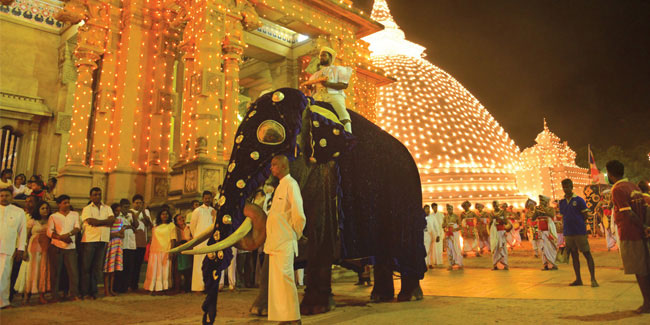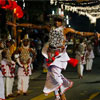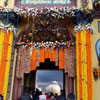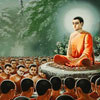Duruthu Full Moon Poya Day in Sri Lanka
Duruthu Full Moon Poya Day in Sri Lanka is held on February 2. In honour of Lord Buddha's first visit to Sri Lanka. This event in the first decade of the month February is annual.  Help us
Help us

This poya day is celebrated on the first full moon in January and marks the first visit of the Buddha to Sri Lanka. Duruthu Full Moon Poya is marked with a public holiday in Sri Lanka.
What is the important of Duruthu Poya? The significance of Duruthu Full Moon Poya Day is that it marks Gautama Buddha's first visit to Sri Lanka. It was on a day like today, nine months after the Enlightenment, that Gautama Buddha, set foot on Sri Lanka for the first time to solve a confrontation between the Yaksha and Naga Tribes.
The Buddha first visited Mahiyanganaya in the Uva Province of Sri Lanka about 2,500 years ago. According to the ancient texts of Sri Lanka, the Mahavansa and Dipavansa, the Buddha visited to bring an end to fighting between the two main tribes on the island.
During his visit, the Buddha delivered sermons to the tribes. After listening to the sermons, the tribes gave up fighting with each other and started to respect each other with dignity.
Similar holidays and events, festivals and interesting facts
 Thai Pongal in Sri Lanka on January 14 (is a harvest festival dedicated to the Sun. It is a four-day festival which according to the Tamil calendar is usually celebrated from January 14 to January 17);
Thai Pongal in Sri Lanka on January 14 (is a harvest festival dedicated to the Sun. It is a four-day festival which according to the Tamil calendar is usually celebrated from January 14 to January 17); Navam Full Moon Poya Day in Sri Lanka on February 2 (The Buddha proclaims for the first time a code of fundamental ethical precepts for the monks);
Navam Full Moon Poya Day in Sri Lanka on February 2 (The Buddha proclaims for the first time a code of fundamental ethical precepts for the monks); Maha Shivaratri in Sri Lanka on February 15 (is a annual festival celebrated annually in honor of Shiva. There is a Shivaratri in every luni-solar month of the Hindu calendar, on the month's 13th night/14th day, but once a year in late winter and before the arrival of Summer, marks Maha Shivaratri which means "the Great Night of Shiva");
Maha Shivaratri in Sri Lanka on February 15 (is a annual festival celebrated annually in honor of Shiva. There is a Shivaratri in every luni-solar month of the Hindu calendar, on the month's 13th night/14th day, but once a year in late winter and before the arrival of Summer, marks Maha Shivaratri which means "the Great Night of Shiva"); Magha Puja on March 3 (Full moon, 3rd Thai lunar month);
Magha Puja on March 3 (Full moon, 3rd Thai lunar month); Sri Lanka Independence Day on February 4
Sri Lanka Independence Day on February 4 Air Force Day in Sri Lanka on March 2
Air Force Day in Sri Lanka on March 2 World Idli Day on March 30
World Idli Day on March 30